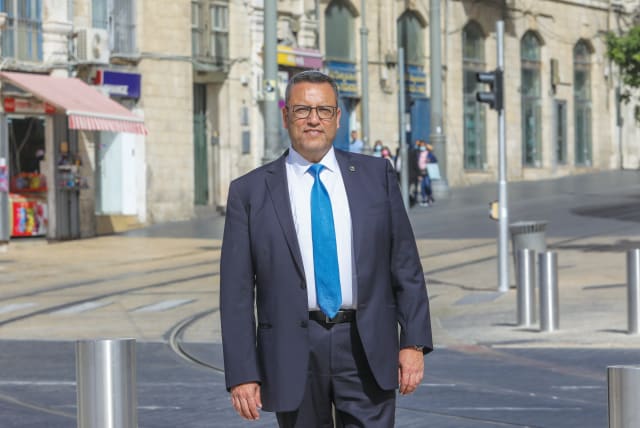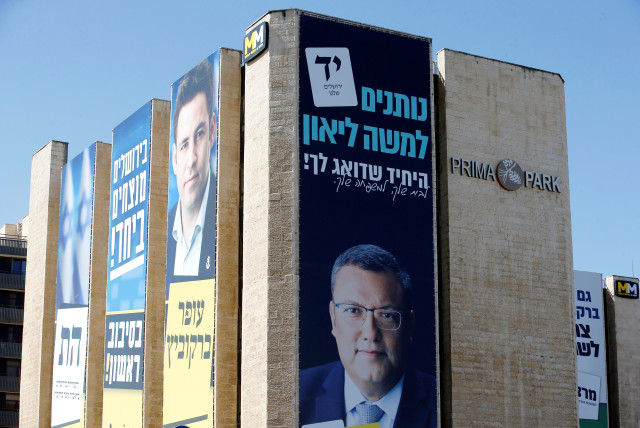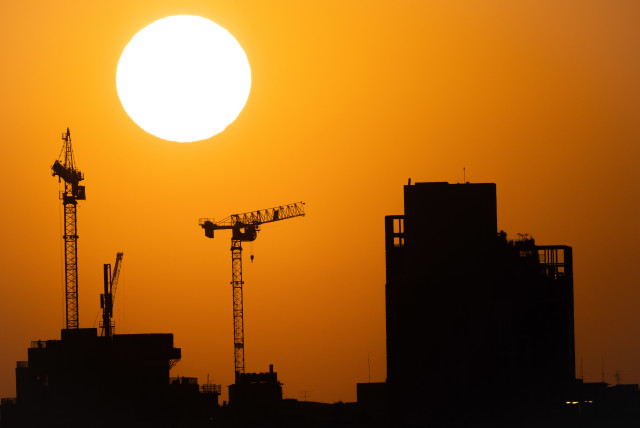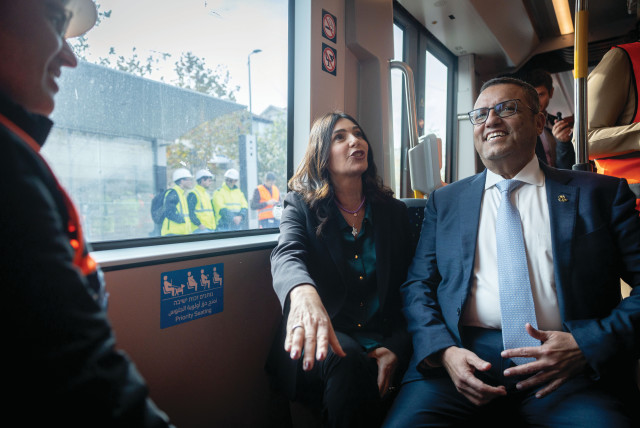Jerusalem Day: Mayor Moshe Lion talks issues plaguing Israel's capital

Asking Mayor Moshe Lion the tough questions – on the eve of the 56th Jerusalem Day and five months before elections.
Moshe Lion is currently enjoying the best of all worlds – as of now, no one is running against him for mayor, leaving him free to pursue what he did not achieve in the 2018 elections – establishing a list for the city council.
Technically, a mayor in the State of Israel does not need his own faction on the council; the only thing that can lead to his removal is a failure to pass a budget law. Lion, with his excellent connections in the top levels of government (he is former director of Prime Minister Benjamin Netanyahu’s office), has strong support, often resulting in the effortless acquisition of generous budgets.
Lion granted an interview to the Magazine ahead of Jerusalem Day in his office on the sixth floor of Building 1 in Safra Square, from where panoramic views of the Old City can be seen.
Lion was relaxed, happy and confident. He even shared some chocolates from his “secret drawer” with me.
How can one say that Jerusalem, Israel’s capital, is a united city, when Jews barely set foot in many neighborhoods on the eastern side, with the exception of the security forces?
I do not agree with this assertion in any way. I myself stroll through the Old City almost every Shabbat, and I see thousands of Israelis walking around there. There may be neighborhoods which are more dangerous, but you can also walk around Jebl Mukaber – my chief of staff shops there every week. I think that Jerusalem is a very safe city, very safe to walk in, and I can say with confidence that Jerusalem is a united city.
You have been the mayor of Israel’s largest city – its capital – for five years, but Jerusalem remains Israel’s poorest city.
Everything will be good.
Go on...
In order to make this city stronger, we need to look after our more vulnerable residents while attracting more prosperous, successful people to join us here. This is something I’m working on.
How?
By building new apartments all over the city.
In reality, that means you encourage the building of towers that mar the city’s character and appearance, and destroys the landscape.
So what do you want? You don’t want to build towers, you don’t want to destroy the landscape, you don’t want to build in green areas... what am I supposed to do?
Are there any limits regarding the height of the buildings going up?
In order to fight poverty and strengthen the city’s economy, I am building thousands of housing units to attract more people to come and live here. I am also planning to build two million square meters of office space in several locations for Premium’s Hi-Tech Quarter.
But Mobileye co-founder Amnon Shashua said not long ago that he is considering moving the company out of Jerusalem.
He didn’t say that. He denied it. Prof. Shashua is one of the biggest investors in Jerusalem. He recently built the biggest hi-tech building in Jerusalem. I don’t see any reason for Mobileye to leave the city. This simply isn’t true.
Do you meet hi-tech people in Israel and from around the world? Are they coming to you to hear about options in Jerusalem?
Of course I meet them, they invest here! Hi-tech is developing significantly here. I have no doubt that when we complete our building projects at the entrance to the city, on Har Hotzvim, on Givat Ram, hi-tech will grow very significantly here, as there will finally be offices for these companies to work in.
Yet about a third of the city’s population, the ultra-Orthodox, most of them do not study the core curriculum and do not know English, or math... How do you think they will fit into the hi-tech world you are creating here?
Everyone who wants and is able to work in hi-tech in Jerusalem will be able to do so. And those who don’t yet live in Jerusalem will move here for the jobs in hi-tech.
Can you guarantee that they will be paid here as they are in Tel Aviv?
Of course, but you have to remember that, at the end of the day, payment levels depend on demand.
In the 2018 elections, you ran on two platforms – sanitation and construction. As for sanitation, you have definitely delivered, and the city is clean. As for construction, the feeling of many is that there are no red lines. Why not adhere to the plans of former city engineer Uri Shitrit, who stated that towers should be built only on the outskirts of the city and not in the center?
So you want Jerusalem to be poor? You can’t tell me ‘I want a strong population, hi-tech, I want people to come here to live – but don’t build towers.’ Where do you want me to build apartments for them? Don’t build in Reches Lavan (White Ridge), don’t build in the forests surrounding Jerusalem?
I agree with you to some extent and have pledged to maintain the green envelope of Jerusalem. But you can’t preserve all of the green spaces around the city, not build towers, and expect growth and prosperity here. What we are doing is ensuring that the air is clean and there are places to walk and enjoy the outdoors in order to attract a young, strong, dynamic population.
How are you sure that strong populations are indeed the ones that will come?
I simply asked the entrepreneurs who have already started selling, to show me who buys. Some are from outside, some are locals, but one thing I can guarantee – no apartment remains empty. The fact is there is a great shortage of apartments in Jerusalem.
What is the profile of these apartment buyers?
Haredi, secular and religious – all types of people. I need one thing from those who come to live here – they have to want a high standard of living. That is, a high economic profile – and this is what is happening now.
For too many, Jerusalem is a poor city, an anxious city, a city with no future.
Is this perhaps an innate anxiety of Jerusalemites?
Take, for example, the rent in the free rental market – it’s crazy.
Rent will go up because there is not enough supply – it is either towers or a lack of apartments.
Why aren’t you encouraging more long-term rental projects? This could be a solution.
This is exactly what we’re doing. A large part of today’s construction projects include many long-term rental projects.
Jerusalem’s public transportation is far from meeting the city’s needs; it is often crowded and running late. Do you travel by public transport? Do you know what it’s like with the overcrowding? What’s the problem with adding more light rail cars?
If I need to get from Safra Square to Mount Herzl, then yes, I and the team take the light rail. I like it, but I’m not a good example. I want to make it so that people like me, despite my crazy schedule, will travel by light rail. It’s a real pleasure. The first city in Israel to eliminate traffic jams will be Jerusalem.
We have already increased the number of buses in the city by 50%. The light rail routes are also being extended. By September, the Red Line will reach Hadassah Ein Kerem.
September is very close to the elections [October 31], right? Very convenient for you!
[No response.]
Mitzpetel [Lupine Hill], the beloved beauty spot in Armon Hanatziv – what’s going on? The municipality holds a festival there but has now approved the construction of a large police station on that spot. Don’t you speak with one voice in Safra Square?
I guarantee this festival will continue every year, and not one lupine will be harmed. This is another distortion of what we are actually doing in the area. It will not be built on the lupine fields, nor will it affect the view of the lupines because we are limiting the number of floors.
Finally, what is most important and what everyone ignores is that this neighborhood needs a police station. So where do we build it? On the neighbor’s roof? Do you think that if, for example, I could have put the police station somewhere else, I wouldn’t have done that? Am I here to destroy?
I sat with people in the community and with Yehuda Ben Yosef, a member of the executive board, and together we came to an agreement on how and where it should be. The area will not be harmed.
According to news published this week, a large plot of land in the Armenian Quarter was purchased by an organization representing Jews, which has caused great concern among the city’s Armenian community. What is your position on this?
That is a private transaction; I have nothing to say about it.
The east side: Has the second five-year budget been approved? It was due to be published this week, for Jerusalem Day, but there is a rumor that there is no approval for it. It was supposed to be over NIS 4 billion.
Not true. A government decision is currently being approved confirming that it will be at the same level as the previous budget – i.e., a little over NIS 2 billion. The reason is that there was actually no plan for what was proposed before, NIS 4.3 billion. It is impossible to approve a budget without an approved plan.
But I promise that if we spend the NIS 2.3 billion approved budget in less than five years, I will definitely go to the government and demand a budget increase. For me, the east side budget is of the highest priority.
What is the municipality’s role in this?
The entire issue of education is the responsibility of the municipality. What is important to me is to invest money so that we see a real improvement. Everyone understands the importance of this.
What is your position regarding the extension of granting Israeli citizenship to east Jerusalem residents?
This is a difficult question. The percentage of residents in the eastern part of the city who want to remain within Israel is increasing all the time. This is obviously because in the last five years, we have invested billions of shekels and cleaned up the city. But it’s not in my hands – I am not the Knesset, and I am not the government of Israel. I can make recommendations, but I still don’t have a clear plan of action on this issue. When they ask me, I will have an answer.
Elections are close. As of today, you are running alone.
I’m in favor of having more candidates because if it looks like the results are a foregone conclusion, then people won’t come out to vote.
Residents are debating, fearing there will once again be a city council in which more than half of its members are haredi.
Yet Jerusalem’s residents were not harmed by the ultra-Orthodox majority on the council.
What about the city’s budget?
We are waiting for the state budget. But I believe that we will go beyond the NIS 13 billion mark. A municipal budget will come after the state budget – and the Jerusalem Regulation budget will cross the billion threshold.
Where are the priorities this time?
Education and cleanliness, beautifying the city with flowers.
Why not trees?
Who said not trees? Wherever trees are possible, I approve. This year, we will plant 9,000 trees, while I managed to save 11,000 trees from being uprooted in White Ridge!
In regard to traffic on the sidewalks endangering pedestrians – motorcycles, bicycles, scooters. Will there be regulations?
Yes, we have a policy: In the city of Jerusalem, there will be no more scooters for rent. They are a danger to lives, and the city is not adapted for them. Motorcycles are also forbidden on the sidewalk.
Regarding bicycles, there is the bicycle rental project – JeruFun. About 50 stations have already been deployed throughout the city through which hundreds of bicycles are rented every month. There are currently 70 kilometers of safe, paved cycling routes. And as part of our plans, dozens more bicycle paths will be added that will connect the different neighborhoods to the center. A total of 200 kilometers of bicycle paths are being planned.
As they do every year in honor of Jerusalem Day, Jews will march with flags inside the Muslim Quarter, despite the protests and fear of agitation. What is your position on this?
I am in favor of the flag parade taking its original route. The march has been following the same route for decades, and that is how it should continue. At the same time, the marchers must remember that they are marching in an area that is also a residential neighborhood and must behave with respect toward local residents.
What have you learned in the five years of your mayoral position?
Every day I learn something new. I have used all the experience I have gained in my life so far – as the head of the Prime Minister’s Office, and as Israel chairman, during which time I owned one of the seven largest accountancy firms in Israel.
There is a fascinating population here, and I would like to be the mayor of all of them. My WhatsApp is open to everyone, and I read all the messages I receive, which enables me to see where the problems lie – it’s a direct connection. Most of the issues are very real, and I treat them with respect.
I know that this is Israel, and Jerusalem is a city which mirrors the entire State of Israel, only smaller. It has its own security and tourism – we are No. 1 in the country – all religions are here, and all sectors in each religion... Last week I was a guest in some of the churches, and I attended Iftar [the fast-breaking meal] almost every evening during Ramadan – a great experience. Last Shabbat, I was able to bring a Moroccan-style Shabbat to the Great Synagogue, which is Ashkenazi.
But the tensions between haredim and the secular still persist. People are put off by that.
Friction between ultra-Orthodox and secularists – I think it has decreased significantly. It is present everywhere in the country, but specifically in Jerusalem it has decreased significantly. There is still this image, but the situation here is different, and it gives me hope for the entire State of Israel.
We, as one people and one country, should be able to live side by side in harmony, despite our differences. ■
Jerusalem Post Store
`; document.getElementById("linkPremium").innerHTML = cont; var divWithLink = document.getElementById("premium-link"); if (divWithLink !== null && divWithLink !== 'undefined') { divWithLink.style.border = "solid 1px #cb0f3e"; divWithLink.style.textAlign = "center"; divWithLink.style.marginBottom = "15px"; divWithLink.style.marginTop = "15px"; divWithLink.style.width = "100%"; divWithLink.style.backgroundColor = "#122952"; divWithLink.style.color = "#ffffff"; divWithLink.style.lineHeight = "1.5"; } } (function (v, i) { });



